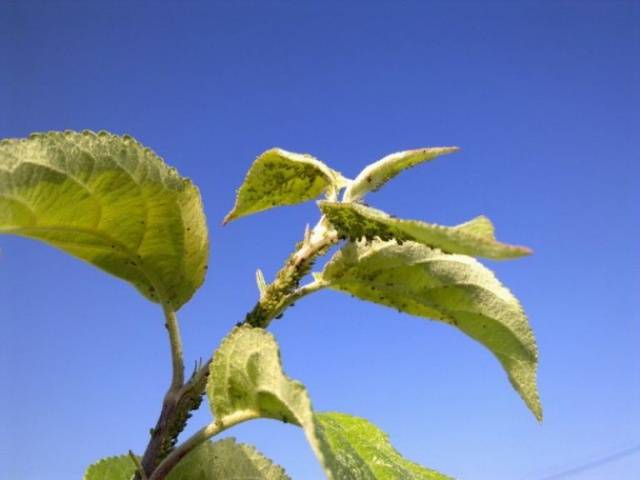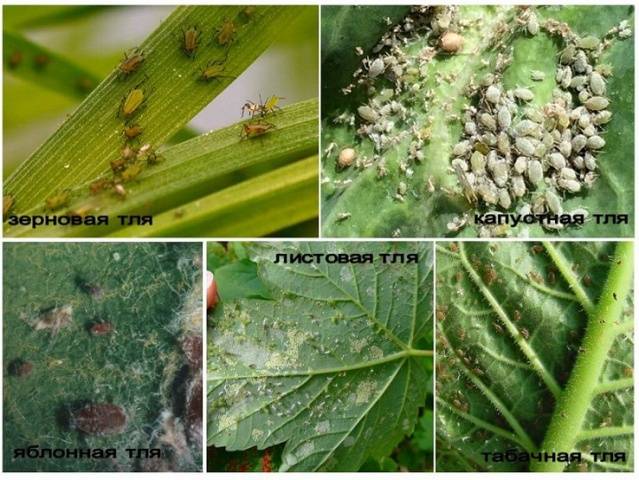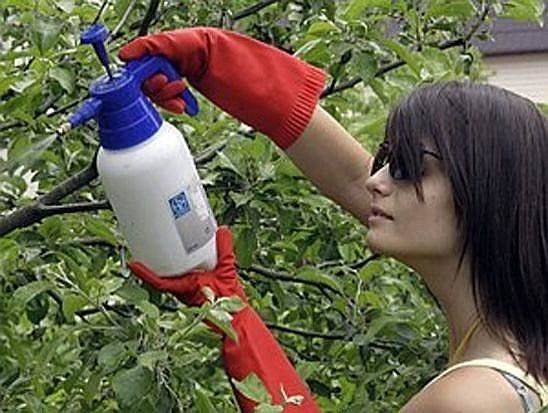Content
Aphids of fruit trees are very small (up to 7 mm) winged or wingless insects that feed on the sap of young shoots and leaves of various trees and shrubs. They pierce the soft, succulent tissues of plants with special proboscis and suck out the plant sap, which contains many nutrients necessary for a favorable vegetation of garden crops. With a large accumulation of aphids on young shoots and leaves, trees suffer from a lack of trace elements absorbed by aphid colonies, stop growing and give new growths.
Some information about aphids
- All over the world there are more than 4 thousand species of aphids, about 1000 of them live in European countries, which includes Russia.
- Aphids lay eggs in the fall in the ground or in cracks in the bark of trees, in spring voracious caterpillars emerge from the eggs, and by the beginning of flowering of fruit trees they turn into an adult insect, ready to lay new eggs. During the spring-summer season, aphids are capable of producing at least three generations of offspring. Imagine this huge number of hungry insects that pounce on all the garden and horticultural crops in your garden.
- Aphids differ from each other in color and body size, their different species prefer to settle in colonies on individual plants, even the names of subfamilies are given to them by the type of culture: green apple aphid, plum aphid, peach aphid, gooseberry, currant.
- Whatever the name of this harmful insect, and the purpose of all species of aphids is the same - to produce their own kind, and for this they need food that they get by destroying cultivated plants of the garden.
- Gardeners who find aphids on fruit trees know that other pests will follow them - these are ants, or, conversely, having noticed ants, they determine that there is a colony of aphids nearby. This symbiosis of aphids and ants has been known for a long time, there is a misconception that ants eat aphids, so there is no need to destroy or drive them away. This is not at all the case, ants live and even protect aphid colonies because of the honeydew - a sweetish odorous liquid that aphids secrete. For ants, this is a delicacy that contains many nutrients, it is because of it that such a welded symbiosis of these insects occurs.
- Aphids can form colonies not only on fruit trees and berry bushes, many vegetables are attacked by it. Throughout the season, especially when the formation of new young shoots begins in the garden, and vegetable seedlings enter the stage of active vegetation, aphids begin their detrimental effect on garden and vegetable garden crops.
Consequences of an insect attack
Aphids on fruit trees, shrubs and vegetable crops can cause enormous harm to plants:
- plant leaves not getting enough nutrients and moisture due to the invasion of aphids, they gradually dry out, curl into tubes, and then fall off before reaching the required growth;
- honeydew secreted by aphids in the process of life clogs the pores of leaves and stems, blocking access to the sun's rays, natural the photosynthesis of the plant is disrupted and leads to the death of young growth of fruit trees;
- these insects and ants following aphids are carriers of fungal and bacterial diseases, trees, through their fault, can get sick and die;
- if you do not carry out measures to combat aphids on fruit trees, shrubs and vegetable seedlings, then you can lose a significant part of the harvest or even be left without it.
Methods and means of pest control
You can get a decent harvest in the garden and vegetable garden if all plants are protected from diseases and harmful insects. Gardeners spend a lot of time and effort on the fight against aphids on fruit trees, but this is necessary, because no one wants to give gluttonous pests a part of the crop that they grow on their plots of land. In our article, we will focus on the means and methods of dealing with aphids on fruit trees.
Methods
- Planting repellent plants in the areathat scare away aphids from fruit trees and shrubs. These plants include: garlic, onions, Dalmatian chamomile, coriander, marigolds.
- To attract aphids, can plant away from horticultural crops, plants that this insect prefers: nasturtiums, begonias, sleeping pills, mallow.
- Linden and viburnum are also favorite trees for aphids, should not be planted fruit and vegetable crops near these plants.
- It is necessary regularly carry out preventive treatment of the garden and vegetable garden by spraying trees and bushes, spills plots of soil by chemical or folk remedies.
- Heat treatment of plants (dousing with hot water at a temperature not lower than 70 °) in early spring or late autumn. Aphids do not tolerate high temperatures, they quickly die from exposure to hot water. This method can be applied to plants on which a large colony of aphids has settled and cannot be destroyed in any other way (currants, gooseberries, raspberries).
- If the plant is compact and short, you can use insect washing method from the leaves under the pressure of a stream of water hose or watering can, and then spill the soil underneath with hot water.
- Trapping belts help protect fruit trees from ants - the main carriers of aphids on trees.
Chemicals may contain components that can cause allergic skin reactions, burns of the cornea of the eyes. Folk remedies also cause burning, itching, redness of the skin. Be smart.
Facilities
In specialized stores, you can find many chemical and biological agents that are used to combat aphids (and other insects) on fruit trees, berry bushes and vegetables:
- Fitoverm - the biological product is produced in ampoules and vials, after processing the plants, it begins to act in 4-5 days, the aphids that eat the leaves sprayed with the agent become immobile and die;
- Trichopolus - the drug in the form of tablets causes paralysis in aphids, the drug acts until it is washed off the leaves by rain, is safe for people and animals;
- Aktofit - the biological product also causes paralysis of insects when eating the sap of the plant, 2-3 days may pass before the onset of action, then the aphid dies;
- Fufanon - phosphorus-containing agent is quickly absorbed by all parts of plants: leaves, shoots, roots. Aphids, having tasted such a "treat", die within 24 hours. The drug retains its properties for up to 4 days or until the first heavy rain, it is very toxic, be careful.
- Arrow - begins to act after 2 days, destroying aphids and other pests, the duration is from 2 to 3 weeks.
For adherents of maintaining an ecological balance in nature, there are less dangerous means of fighting aphids. Gardeners who do not accept the use of chemistry on their plots have learned how to process gardens and vegetable gardens with environmentally friendly solutions, infusions, decoctions according to folk recipes.The video posted after this paragraph is devoted to the preparation of an aqueous solution with the addition of ammonia. We advise you to familiarize yourself.
The following video describes the use of baking soda, iodine and laundry soap in the fight against aphids on fruit trees. All these funds are safe both for nature and for humans, but we will not hide from you that such treatments with folk remedies do not work immediately and are not as effective as chemical and biological drugs. It is necessary regularly, at least 6-8 times per season, to spray all plants with them. Be patient if you are for the environment.
Ants accompanying the appearance of aphids on a tree cannot fly. In the fight against them, trapping belts, fixed on the lower part of the trunk and branches of the fruit tree, help. You can make such belt belts yourself, or buy fly tape from a store and attach it to the desired location. Watch the attached video, you will learn from an experienced gardener how this can be done in practice.
We mentioned earlier that one of the methods for controlling aphids is to plant repellent plants that protect our fruit and vegetable crops, mainly flowers, herbs, herbs, trees and bushes with pungent odors. They are attractive to aphids, which shower them with their "attention" and distract from the plants we want to protect. The following video provides a more detailed list of such plants.
Conclusion
Whatever method you choose to combat aphids on fruit trees, the main thing is to achieve a favorable result, to destroy or expel pests from our garden and vegetable garden. In a healthy garden, which hardworking owners take care of tirelessly, a decent harvest should grow, which will only delight, not upset, gardeners.
A person can do everything, he can achieve everything that he has planned. In this article, we decided to tell you about the methods of dealing with aphids, we hope that we have coped with our task. Read, watch videos and photos, we tried to help you. We wish your garden a long and healthy life without problems like nasty aphids.











